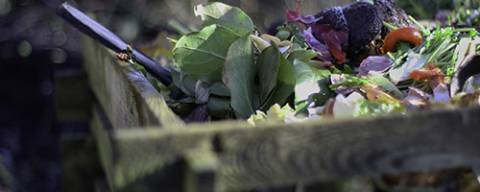Backyard composting | Compost indoors with worms | Subscribe to food waste pickup
Applying compost | Barriers and benefits | Video: A Look at CSU's Composting Facility

In nature, dead plants and animals naturally decompose and nutrients are turned into new life. Compost is the end product of decaying organic material broken down by microbes, managed by humans. It is a stable, loosely structured soil amendment in which particles bind together and chemical elements are made available to feed plants.
Easy compost recipe
| Ingredients: | Directions: |
|
-Browns - leaves, twigs, yard debris, paper products, cardboard -Greens - grass clippings, plant trimmings, coffee grounds, fruit and vegetable scraps, breads, egg shells, manure (from non-carniverous animals) -Air - Turn periodically. Living organisms that break down the material and debris need air. -Water - Keep as moist as a damp sponge. Water is necessary for decomposition. |
|
How does compost happen?
- Microbes get to work. Decomposers break down complex materials into water, carbon dioxide and simple compounds.
- Temperature in compost pile rises. Ideal temperature at home is 150 degrees. 130 degrees is typical. Commercial facilities get up to 160 degrees and higher.
For faster results:
- Be proactive and start today! Remember, this process takes time. Patience, young grasshopper.
- Check the temperature. Use a compost thermometer. The higher the heat, the faster it will break down. Beware: If it gets too hot, it will dry out.
- Obtain extra ingredients. Inquire at grocery produce departments, coffee shops, etc.
Applying finished compost
| Why? | All the components found in compost are substances plants need to grow. |
| How often? | Any time but especially before planting. Add fresh compost at least two times a year. Think of it like a bank account. The plants make withdrawals as they take up nutrients, so you must make deposits to prevent a negative balance. |
| How early? | 1 - 2 months before planting is ideal. You want to give the compost time to innoculate the existing garden soil. |
| Where? | Add to garden beds - apply closer to the surface where the active roots will be. Then top dress periodically. Some homeowners add compost to their lawn. |
| How? | Mix compost into the top two inches. You'll want the material to stay intact longer. Once you introduce microbes, the material will be consumed quicker. Therefore, it's best not to till. |
Common barriers
- Potential odor - Regularly turn your compost pile and odor is not an issue. Stagnant "greens" can emit odor as they break down. For inside the house, consider using a compost pail with a carbon filter lid
- Pests - Cover "green" waste with "brown" waste, such as leaves, shredded paper, or hay to keep pests at bay. Avoid meat, dairy and grease.
- Inconvenience - Make food scrap collection a routine, with a kitchen countertop compost pail. Empty it into your compost pile when it's full. Place your compost pile close enough to your house so inclement weather doesn't keep you from taking food scraps outside.
- Unsightly mess - If tidiness is important to you, consider using an outdoor composting bin.
- Turning the pile is difficult - Opt to use a closed bin system that is set up to turn the waste.
- It takes too much time - Be patient. It takes time but it is worth the wait. It's like investing. When you start investing, you don't see financial returns right away.
Why compost?
- To enrich your soil. Well-made compost is the single best soil amendment.
- To reduce organic waste in landfills. Organic waste that decomposes in anaerobic conditions releases methane, a greenhouse gas that contributes to climate change.
- To make a difference. When you divert food and yard waste from landfill disposal, you also save precious landfill space. Organic waste makes up about 30% of waste found in landfills.
Benefits
- Compost reduces erosion and runoff. Compost binds particles together to reduce the impact water has across the soil surface. It allows better water infiltration into the soil.
- Compost supplies vital nutrients to the soil. Compost provides organic matter which allows nutrient uptake.
- Compost neurtalizes contaminants. Heavy metals and soil contaminants that are bound or locked up chemically are degraded or deactivated. Compost also mitigates disease and pathogens in soil.
Subscribe to food waste pick-up
These local companies offer food waste pick-up if you would like to collect it and have them do the dirty work of turning it to compost. Please contact them to subscribe to their hassle-free service.
